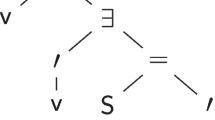Abstract
Orthodoxy holds that there is a determinate fact of the matter about every arithmetical claim. Little argument has been supplied in favour of orthodoxy, and work of Field, Warren and Waxman, and others suggests that the presumption in its favour is unjustified. This paper supports orthodoxy by establishing the determinacy of arithmetic in a well-motivated modal plural logic (Theorem 1). Recasting this result in higher-order logic (Theorem 13) reveals that even the nominalist who thinks that there are only finitely many things should think that there is some sense in which arithmetic is true and determinate.
Similar content being viewed by others
References
Bacon, A. (2018). The broadest necessity. J. Philos. Log., 47(5), 733–783.
Bacon, A., & Dorr, C. (forthcoming). Classicism. In P. Fritz N.K. Jones (Eds.) Higher-Order Metaphysics. OUP.
Button, T., & Walsh, S. (2016). Structure and categoricity: Determinacy of reference and truth value in the philosophy of mathematics. Philos. Math., 24(3), 283–307.
Church, A. (1940). A formulation of the simple theory of types. J. Symbol. Log., 5(2), 56–68.
Dedekind, R. (1893). Was sind und was sollen die zahlen? f vieweg.
Evans, G. (1978). Can there be vague objects? Analysis, 38(4), 208.
Feferman, S., Friedman, H., Maddy, P., & Steel, J. (1999). Does mathematics need new axioms? Bullet. Symbol. Log., 6, 401–413.
Field, H. (1998). Which undecidable mathematical sentences have determinate truth values. In H.G. Dales G. Oliveri (Eds.) Truth in Mathematics (pp. 291–310). USA: Oxford University Press.
Frege, G. (1884). Grundlagen der Arithmetik. Wilhelm Koebner: Breslau.
Hamkins, J.D. (2012). The set-theoretic multiverse. Rev. Symbol. Log., 5(3), 416–449.
Hamkins, J.D. (2015). Is the dream solution of the continuum hypothesis attainable? Notre Dame J. Formal Log., 56(1), 135–145.
Lewis, D. (1984). Putnam’s paradox. Austral. J. Philos., 62(3), 221–236.
Lewis, D. (1986). On the plurality of worlds. Wiley-Blackwell.
Linnebo, Ø. (2013). The potential hierarchy of sets. Rev. Symbol. Log., 6(2), 205–228.
Martin, D. (2001). Multiple universes of sets and indeterminate truth values. Topoi, 20(1), 5–16.
McGee, V. (1997). How we learn mathematical language. Philos. Rev., 106(1), 35–68.
Parsons, C. (2007). Mathematical Thought and its Objects. Cambridge University Press.
Quine, W. V. O. (1970). Philosophy of logic. Harvard University Press.
Stalnaker, R. (1976). Propositions. In A.F. MacKay D.D. Merrill (Eds.) Issues in the Philosophy of Language: Proceedings of the 1972 Colloquium in Philosophy (pp. 79–91). New Haven and London: Yale University Press.
Warren, J., & Waxman, D. (2020). A metasemantic challenge for mathematical determinacy. Synthese, 1–19.
Author information
Authors and Affiliations
Corresponding author
Additional information
Publisher’s Note
Springer Nature remains neutral with regard to jurisdictional claims in published maps and institutional affiliations.
Rights and permissions
About this article
Cite this article
Goodsell, Z. Arithmetic is Determinate. J Philos Logic 51, 127–150 (2022). https://doi.org/10.1007/s10992-021-09613-9
Received:
Accepted:
Published:
Issue Date:
DOI: https://doi.org/10.1007/s10992-021-09613-9




